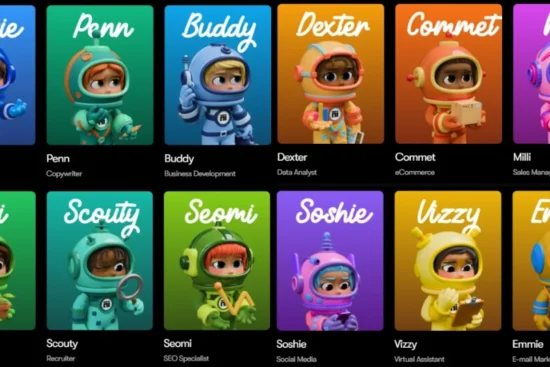
Cooking has always been a blend of science and art, requiring a delicate balance of ingredients, timing, and technique. Fast forward to 2025, and artificial intelligence (AI) has taken center stage in the culinary world, redefining how we prepare, cook, and enjoy our meals. Smart kitchen gadgets, powered by advanced AI, are transforming kitchens into high-tech hubs of convenience and efficiency. From smart ovens that recognize recipes to AI-powered meal planners, here’s how technology is making cooking easier than ever.
The Rise of AI in the Kitchen
In 2025, AI-driven kitchen gadgets are designed to handle the most tedious aspects of cooking while enhancing creativity and reducing waste. Leveraging machine learning, voice recognition, and IoT (Internet of Things) connectivity, these tools seamlessly integrate into modern lifestyles.
The growing demand for healthier meals, eco-friendly practices, and convenience has fueled the development of smart devices. These gadgets are not just futuristic—they’re practical and accessible, helping home cooks and professionals alike to prepare dishes with precision and ease.
Smart Kitchen Gadgets Changing the Game
Here are the most groundbreaking AI-powered kitchen tools transforming cooking:
1. Smart Ovens
Gone are the days of overcooked or undercooked meals. Smart ovens use AI to detect the type of food being prepared, automatically adjusting temperature and cooking time for perfect results.
- Key Features:
- Built-in cameras that monitor food in real time.
- Automatic updates with new recipes.
- Voice-controlled commands for hands-free operation.
- Example: Brands like Tovala and June have introduced ovens that can bake, broil, and air-fry with little to no human intervention.
2. AI-Powered Refrigerators
Today’s refrigerators are more than just storage units—they’re meal planners and grocery assistants.
- Key Features:
- Real-time inventory tracking with alerts for expiring items.
- Suggesting recipes based on available ingredients.
- Integration with grocery delivery apps for seamless restocking.
- Example: Samsung’s Family Hub refrigerator suggests meals, tracks food usage, and syncs with your calendar to plan meals around your schedule.
3. Voice-Activated Assistants
AI assistants like Alexa and Google Home have become integral to kitchens, offering hands-free help when you need it most.
- Key Features:
- Providing step-by-step cooking instructions.
- Setting timers, converting measurements, and answering culinary questions.
- Connecting with other smart devices for a cohesive cooking experience.
4. Smart Scales and Measurement Tools
Precision is crucial in cooking and baking. Smart scales simplify measuring by providing accurate readings and syncing with recipe apps.
- Key Features:
- Real-time weight updates for multiple ingredients in one bowl.
- Nutritional analysis of ingredients.
- Compatibility with voice commands and app controls.
5. Robotic Kitchen Assistants
Robotic arms and AI chefs are no longer science fiction. These devices handle repetitive tasks like chopping, stirring, and even assembling meals.
- Key Features:
- Pre-programmed recipes for consistent results.
- Customizable options to match personal preferences.
- Safety protocols to prevent accidents.
- Example: Moley Robotics has developed a robotic kitchen capable of replicating gourmet recipes.
Benefits of AI in the Kitchen
The incorporation of AI into cooking is not just about convenience—it’s about enhancing the entire culinary experience.
1. Time-Saving Efficiency
AI gadgets streamline meal prep by automating tedious tasks, allowing users to focus on other activities or simply relax.
2. Reducing Food Waste
With smart refrigerators and AI meal planners, users can make better use of their groceries, minimizing waste and saving money.
3. Healthier Choices
AI tools provide nutritional insights, helping users make informed decisions about their meals and portion sizes.
4. Increased Accessibility
For those with disabilities or limited mobility, voice-controlled and automated gadgets make cooking more accessible and enjoyable.
5. Eco-Friendly Practices
Energy-efficient smart appliances and waste-reducing tools contribute to a more sustainable kitchen.
AI for All Skill Levels
One of the most exciting aspects of AI in the kitchen is its adaptability. Whether you’re a novice or a professional chef, these tools are designed to meet your needs.
- Beginners: Step-by-step guidance and error prevention help build confidence.
- Busy Families: Automated meal planning and scheduling reduce stress.
- Food Enthusiasts: Advanced tools and customization options inspire culinary creativity.
Challenges and Considerations
While the benefits of smart kitchen gadgets are undeniable, there are a few challenges to consider:
- Cost:
High-tech devices can be expensive, though prices are gradually becoming more affordable as technology advances. - Privacy Concerns:
With connected devices, there’s always the potential for data breaches. Manufacturers are addressing this by enhancing security features. - Learning Curve:
Some users may find it challenging to adapt to new technology, but intuitive interfaces and customer support mitigate this issue.
The Future of AI in Kitchens
The kitchen of 2025 is just the beginning. As AI technology continues to evolve, we can expect even more innovative solutions:
- Hyper-Personalization: Future gadgets could analyze dietary needs and preferences to create completely customized meal plans.
- Enhanced Sustainability: AI could optimize energy usage in appliances and promote zero-waste cooking techniques.
- Global Connectivity: With advancements in IoT, smart kitchens will connect seamlessly with other aspects of smart homes, creating an integrated living experience.
Conclusion
AI-powered smart kitchen gadgets are revolutionizing how we approach cooking. By automating tedious tasks, improving precision, and enhancing convenience, these tools make it easier than ever to create delicious, nutritious meals. While challenges like cost and privacy remain, the benefits far outweigh the drawbacks, promising a future where cooking is not only simpler but also more enjoyable.
Whether you’re a seasoned chef or someone who struggles to boil water, 2025’s smart kitchen gadgets have something to offer everyone. As these technologies continue to evolve, the possibilities for innovation in the culinary world are endless.












